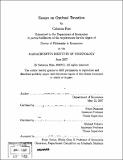Essays on optimal taxation
Author(s)
Reis, Catarina (Catarina Luis Monteiro dos)
DownloadFull printable version (4.701Mb)
Other Contributors
Massachusetts Institute of Technology. Dept. of Economics.
Advisor
Peter Diamond and Michael Golosov.
Terms of use
Metadata
Show full item recordAbstract
This thesis studies the optimal income tax scheme in four different settings. Chapter 1 focuses on the implications of lack of commitment for the optimal labor and capital income tax rates. It finds that it is optimal to converge to zero capital income taxes and positive labor income taxes in the long run. The government will follow the optimal plan as long as its debt is low enough, which implies that the lack of commitment may lead to some asset accumulation in the short run. Chapter 2 determines the optimal tax schedule when education is endogenous and observable, in a setting where agents have heterogeneous abilities. It finds that, for each ability level, it is optimal to subsidize monetary educational costs at the same marginal rate at which income is being taxed. Chapter 3 finds that when entrepreneurial labor income cannot be observed separately from capital income, then it is optimal to have positive capital taxation in the long run. Chapter 4 finds that if human capital expenses are unobservable, then in the optimal plan human capital accumulation will be distorted in the long run.
Description
Thesis (Ph. D.)--Massachusetts Institute of Technology, Dept. of Economics, 2007. Includes bibliographical references (p. 107-110).
Date issued
2007Department
Massachusetts Institute of Technology. Department of EconomicsPublisher
Massachusetts Institute of Technology
Keywords
Economics.